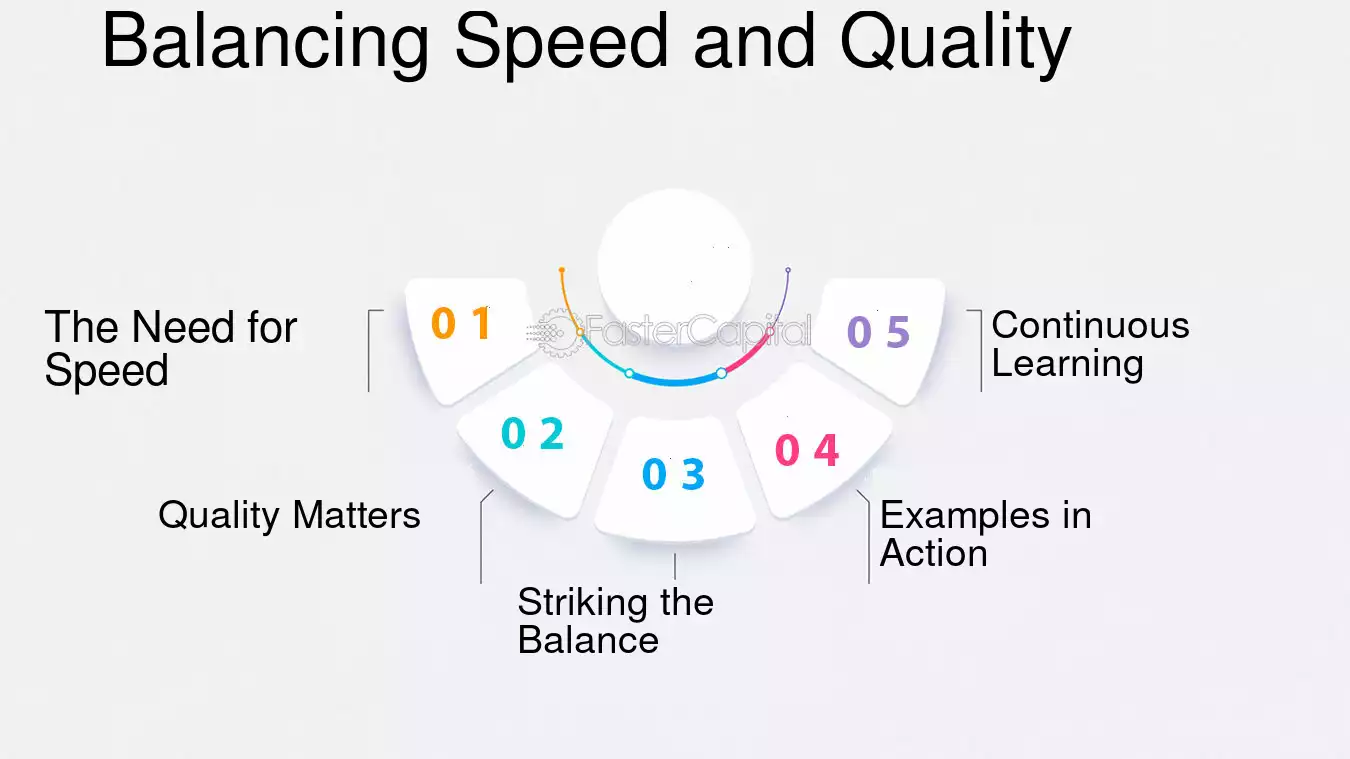In the world of startups, time is of the essence. Attracting customers and staying ahead of the competition is a constant race. The need for speed is undeniable in today’s fast-paced business world, but it should never come at the expense of quality. Maintaining a high-quality standard is essential for ensuring customer satisfaction and staying viable in the long run. To strike a delicate balance between speed and quality, startups must consider factors such as prioritization, organization, and delegation. By paying attention to these and other vital points, startups can stay agile and seize opportunities while also delivering top-notch products or services to their customers.
Here are eight essential points to consider when striving to achieve a balance between speed and quality in startup operations:
Table of contents:
- Define your core values
- Set clear goals
- Emphasize efficient processes
- Foster a culture of continuous improvement
- Prioritize and delegate tasks effectively
- Invest in employee development
- Implement feedback loops
- Test and iterate
- Conclusion
1. Define your core values:
Defining your startup’s core values is crucial in creating a successful business. It not only helps to establish a clear direction and purpose, but it also serves as a guiding principle for decision-making and aligning your team’s efforts. Regarding core values, two essential traits to define are speed and quality. Speed allows you to be agile and responsive to changing market demands while maintaining a high level of quality, ensuring that you maintain a strong reputation and level of customer satisfaction. By establishing and living by these core values, you can set yourself apart from the competition and create a strong foundation for your startup’s success.
2. Set clear goals:
Setting clear goals is essential to achieving success in any endeavor. Whether you’re working on a personal project or leading a team, establishing specific, measurable goals is critical to keeping everyone on track. By defining turnaround times, you can ensure that processes are efficient and timely while setting quality benchmarks helps ensure that the end product meets the standards you’re aiming for. But clear goals aren’t just about measurement – they also help you identify areas for improvement and make adjustments as needed. So, take the time to set clear goals, and you’ll be well on your way to achieving the outcomes you’re after.
3. Emphasize efficient processes:
Focusing on streamlined operations will help your startup reach its full potential. One key aspect is identifying and removing bottlenecks that slow down your team’s progress. Automating repetitive tasks with technology and optimizing workflows allows your employees to focus on more high-value work and complete projects more efficiently. By reducing time wastage, your startup can complete projects faster and deliver high-quality work. Investing time into creating efficient processes also sets the stage for future growth and success.
4. Foster a culture of continuous improvement:
A culture of continuous improvement is so important. Encouraging your team to constantly seek ways to enhance both speed and quality is crucial to staying ahead of the competition. But creating such an environment is easier said than done. You must foster a culture where employees feel empowered to suggest process improvements and experiment with new approaches. This requires trust, collaboration, and a willingness to embrace change. But the rewards are worth it. With a team that is always striving for excellence, you can be confident that your business will continue to grow and thrive.
5. Prioritize and delegate tasks effectively:
Effective prioritization and delegation of tasks can be the key to success in any project or endeavour. It is crucial to identify which tasks require the most attention to detail and allocate resources accordingly. By doing so, we can ensure that these critical tasks are completed flawlessly and on time. Meanwhile, delegating more routine or less complex tasks to capable team members is equally important. It not only frees up time for more strategic initiatives but also helps to develop the skills of our team members. With the proper allocation of tasks, we can foster a productive and thriving work environment that leads to success.
6. Invest in employee development:
Investing in employee development is one of the most thoughtful decisions a company can make. Offering ongoing training and skill development opportunities to your team benefits everyone involved. As employees gain new knowledge and acquire new skills, they become better equipped to deliver top-quality results in a timely manner. In turn, this helps boost morale and motivation among your team, ultimately leading to a more productive and efficient workplace. Plus, when employees see that their company values their continued growth and development, they’re more likely to stay engaged and invested in their work. Personally, investing in employee development can help businesses thrive and succeed in the long run.
7. Implement feedback loops:
In today’s fast-paced and ever-changing business environment, it’s more important than ever to establish feedback mechanisms that capture the input of various stakeholders, including customers and employees. By regularly reviewing and acting upon this feedback, businesses can identify areas where they can improve the speed and quality of their offerings. With suitable feedback loops in place, companies can stay agile and responsive to the needs of their customers and stakeholders, ultimately driving growth and success over the long term.
8. Test and iterate:
The pressure to launch new products and services can be immense, and getting lost in the rush is easy. But launching a product without rigorous testing and iteration can lead to costly mistakes. That’s where an iterative approach comes in. By launching minimum viable products (MVP) or prototypes and gathering feedback from customers, you can quickly test your ideas and identify areas for improvement. This allows you to strike a balance between speed and quality, making sure that your product or service is not just launched quickly but is also continuously improved over time. Ultimately, this approach can save you time, money, and headaches down the road.
Conclusion
As a startup, finding the perfect balance between speed and quality can be a challenging feat. But it’s an ongoing process that requires constant assessment and adaptation to stay ahead of the competition and meet customer expectations.
At our company, we specialize in helping startups achieve their goals by providing MVP development and perfect suggestions for their business. Our team of experts will work closely with you to ensure your product is top-notch in both speed and quality, giving you a competitive edge in the market. So, if you’re seeking assistance in streamlining your operations, don’t hesitate to connect with us today.








